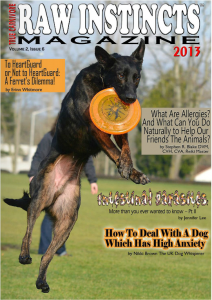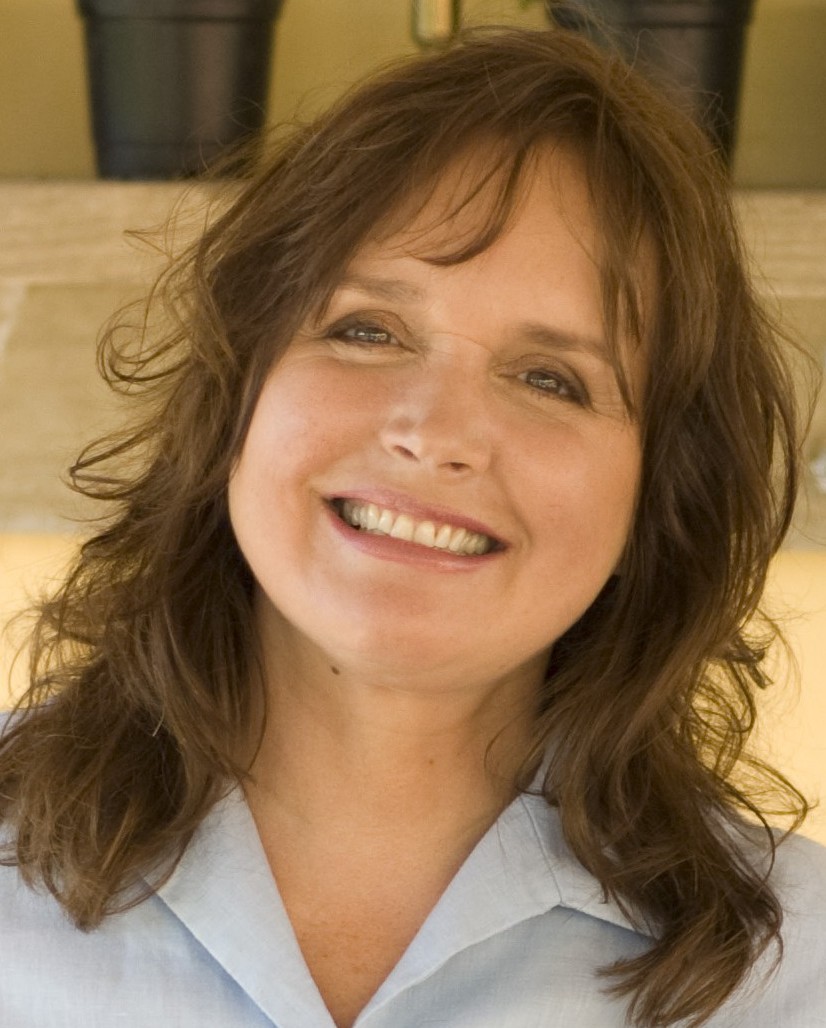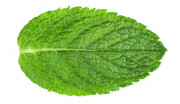As seen in the June 2013 issue of Raw Instincts magazine.
Your pet’s diet is the single most important factor for his or her health, immunity and longevity. I feel like my mantra is fast becoming, “Give your pet the healthiest diet you can create.” With one in three dogs dying of cancer the 21st century is all about disea se prevention. That’s why we have to include healthy foods we may never have thought of adding to their diets before.
se prevention. That’s why we have to include healthy foods we may never have thought of adding to their diets before.
We all think of food in terms of carbohydrates, fats and protein, diligently searching labels to find out how much of each is in the food we’re buying. The cell wall is made up of protein, and carbohydrates are used for energy. However, these basic food groups are unable to maintain the body’s health – maintained, in fact, by the cells ability to detoxify and repair themselves.
Let’s look at it this way: to maintain your home you need cleaning solutions, brooms, mops, paint, screwdrivers and maybe a hammer and nails. In short, we need all manner of tools and it’s always best to have a complete set of tools. In order to understand why complete supplementation is essential, let’s begin with a story about the Maytag Man. The Maytag Man evokes the consummate image of a kindly repairman, eager to help get your washer or dryer up and running so you can have clean clothes. Our dogs and our cats (in fact all of us) have the equivalent of the Maytag Man in all of our cells. Cells are bustling, busy miniature cities having lots of activity going on constantly. While the Maytag appliance company brags that they have no work for their repairmen, our cells’ Maytag Men work continually. It’s how we all stay healthy!
Cells run a race against time, disease and aging. They need specific tools to run this race and win. Imagine if the Maytag Man came to fix your washing machine and you found him leaning against the wall doing nothing. “I forgot my tools.,” he tells you, “So I can’t fix your washing machine.” Just so, our cells must have a complete set of their necessary tools to create health and stave off disease
Vitamins, minerals and phytonutrients are the tools needed that, in truth, keep our dogs and cats-via all the cells in their bodies- healthy. Minerals and vitamins are necessary for the metabolic processes the cells have to complete every single day. Some vitamins, such as C and E, also act as antioxidants and clean out toxins from your pets’ cells. It’s all in a days work to keep those best friends of ours healthy and happy.
The beautiful colors in fruits and vegetables are created from some very healthy compounds, called phytochemicals or phytonutrients. Certain fruits and vegetables, because of their powerful disease preventing effects, have been dubbed ‘super-foods’. Phytochemicals have been shown again and again in scientific research to protect against disease. In 1992 John Hopkins Medical School researched the first phytochemical in Kale. Since then hundreds of powerful phytochemicals have been found. That’s why health magazines write about a 30% reduction in cancer risk from eating foods rich in phytochemicals. Vitamins last for a few hours. The cells grab what they need and rush off to do their jobs. Phytochemicals can last for days dumping toxins and promoting health. Hippocrates never dreamed his words, “Let food be thy medicine.” would be proven true in the research laboratories of the 21st century.
Dogs and cats seem to inherently know that vegetables are healthy for them because they eat grass. Unfortunately, grass is grown to create a lawn rather than be digestible or healthy. They go for the grass because they can’t open the fridge and toss themselves a salad complete with bacon bits! In addition to phytonutrients, greens contain a compound called chlorophyll. Chlorophyll is a green pigment found in almost all plants and algae. It’s an extremely important molecule in photosynthesis allowing plants to absorb energy from light. A marvelous and amazing fact is that the molecular structure of chlorophyll is almost identical to hemoglobin. Hemoglobin is found in red blood cells and is responsible for carrying oxygen to all organs and cells.
Your dog or cat may not know this, but chlorophyll has a bevy of important health benefits. It helps cleanse all the cells of the body, fight infections, heal wounds, build the immune system, build up the health of red blood cells and detoxify all systems. It promotes digestive health -which is why many dogs with acute digestive problems tend to go for the grass. Many of our canine friends can benefit from chlorophyll’s double action in treating and preventing bad breath. As a deodorizer it eliminates odors in the mouth. It also improves digestion-the most likely cause of bad breath in dogs with healthy teeth and gums.
Importantly, chlorophyll reduces the ability of carcinogens to bind with DNA in the liver and other organs. A study published in Cacinogenesis clearly shows that chlorophyll blocks carcinogens, , that damage DNA. The Linus Pauling Institute’s Cancer Chemoprotection Program has indicated that natural chlorophylls in the diet afford cancer protection. It binds to toxic heavy metals eliminating them from the body before they cause organ damage such as kidney failure.
Your dogs and cats have the right idea when he eats grass but the sad truth is that he does this because he has no other source of chlorophyll. Wild hunters get their chlorophyll from the intestines of their prey. They also have a plethora of healthy wild plants to nibble on. Our domestic dogs and cats can’t open the fridge and take out the spinach, broccoli, asparagus, peas, kale, parsley and beans that are rich in digestible chlorophyll. The outside grass they chooses as the last resort is not digestible and it comes out looking just the way it looked when it went in. Of course, kitty grasses that are specifically grown for feline health can be digested.
Our concern over how much protein, fat and carbohydrates our dogs and cats eat every day is very valid. In today’s toxic world we all need to be just as concerned that they get their vitamins, minerals, greens and brightly colored vegetables every day so they can lead long and happy lives.
Dr. Deva Khalsa, VMD

 About Dr. Khalsa
About Dr. Khalsa